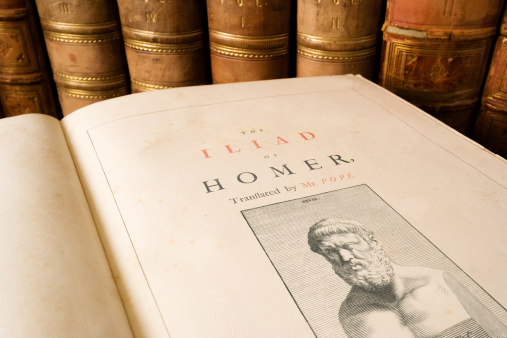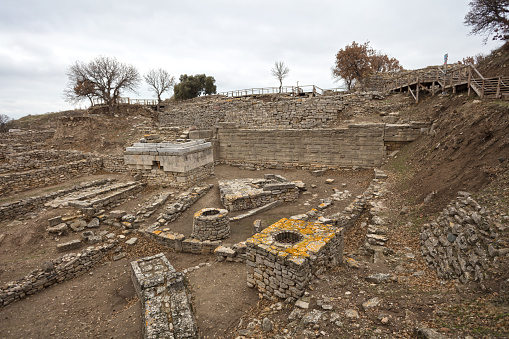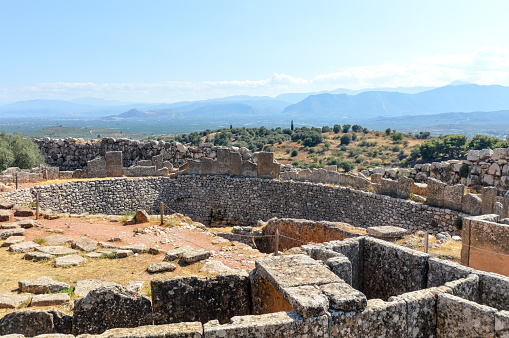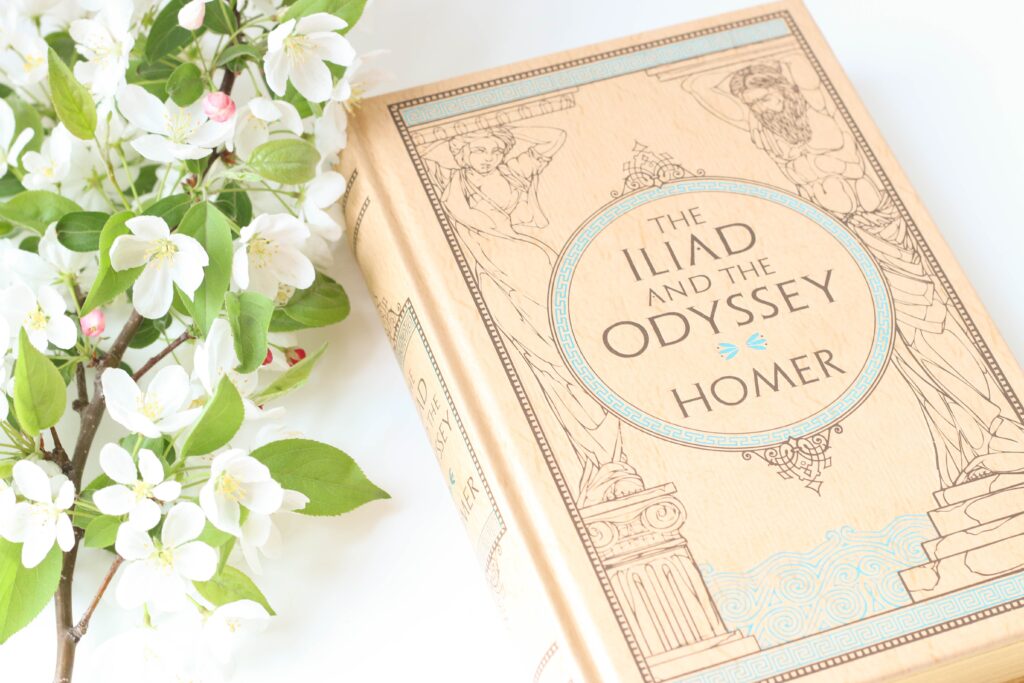After covering a decent amount of information that is sourced to Homer, we come to the question of who is he? In the simplest answer, Homer is a bard–a poet–from Ancient Greece.
We know Homer best for his two epics, the Iliad and the Odyssey. These works are among the oldest works of all of western literature and have been translated and used to draw inspiration from by countless other authors for millennia to come after Homer’s time.

Homer’s works circulated popularly among his fellow Greeks, but even became popular among the Romans, Egyptians, and others as well. The popularity of Homer’s epics dipped for some time during the Middle Ages, but came back strong with the Renaissance and have stuck around as two of the most iconic of the Classics since.
But what do we actually know about Homer personally?
When Did Homer Live?
The question of when Homer lived is a bit hard to determine, and this does come in part because different people from the ancient world to now have given different suggested dates or time periods. For example, Herodotus (believed to have lived from about 484 BC until 425 BC) once wrote that Homer and Hesiod were both certainly from less than four hundred years before him.
Believing Herodotus’s account, that means the absolute earliest we can place Homer’s existence is 884 BC. But we can bring that date at least a little bit down as most people agree the transcribing of the Iliad–understood to be the older of Homer’s two epics–could not have happened before 850 BC.
Furthermore, based on the way the Iliad is written itself and the things that the Iliad describes, we can determine that the latest it could have possibly been written is 630 BC. 850 BC to 630 BC is a very long frame of time for one person’s existence, over two hundred years in fact.
So can we narrow it down further? Well, there is one other important indicator. We know of a disciple of Homer by the name of Arctinus of Miletus and he was born in 744 BC.
While there is some question over the connection of Homer and Arctinus, the ancients attest to this consistently. For this to be true, Homer would have to have been alive past 744 BC–at least long enough for Arctinus to learn from him.
Taking all of that into account, we can take the general academic assumption to probably be true and place the period that Homer was composing his works from between 750 BC and 700 BC. This actually puts Homer several hundred years after the period he was using for his epics, as the Trojan War is believed to have occurred at some point in the 1200s BC.
Where Did Homer Live?
Now that we have gone over the when regarding Homer, it is also appropriate to go over the where. Homer is obviously a Greek, but back in the ancient times there was a fair amount of division within the Greek lands.
We can tell Homer was an Ionian Greek, although the epics were written in what we call Homeric Greek which consists of both the Ionic dialect and the Aeolic dialect (as well as a few other minor influences such as Attic Greek). Other poets after Homer would also typically use Homeric Greek for their writings–Hesiod also uses Homeric Greek, in fact.
Ionic culture was rather spread out in the Hellenic world though, so where specifically can we place Homer beyond that? Two ideas stand as the most accepted: either the island of Chios or at Smyrna.
Homer being from this area actually puts him very close to the area that the Trojan War would have taken place at. This also explains just how incredibly familiar Homer was with the geography of the region, and why he does not seem so familiar with a few other places that were much further way.. like Ithaca.

So we have a sensible idea of where Homer was most likely born and where he lived that even matches up with his writings. We also have some legends that tell us where Homer died.
According to popular tradition, Homer died on the island of Ios and has a grave that is a popular tourist attraction on Ios today. One reason to believe this is true is that Homer’s mother is believed to have been from the island of Ios and that he was choosing to spend his final years there out of admiration for her.
So how did Homer die? The story has been rather conflicting. There is one account that he died of an illness that he caught while living in Ios and there is another account claiming the locals killed him for failing to solve a riddle they challenged him with.
How Did Homer Write The Iliad And The Odyssey?
He did not… Technically. Homer is very well known to have been blind, meaning someone else probably transcribed them while Homer recited them.
In fact, we know from various accounts from Antiquity that talk about Homer’s life that the general consensus is he would tell his poetry wherever he went as he traveled to any crowd that would listen to him. There is a rock on the island of Chios that is claimed to be Homer’s Rock, a popular place for Homer to tell his poetry from while sitting on top of.
In addition to most likely not being the one to transcribe his poetry due to being blind, Homer also certainly learned the stories he told from another source beyond even himself: oral tradition. I mentioned earlier that Homer lived several hundred years after the events of the Trojan War, meaning someone had to pass this telling of history through the ages.
To go into more detail, we should look at the eras of Greek history. Homer comes from the Archaic Greek period while the Trojan War occurred late in the Mycenaean Greek period, but there is a whole period separating those two periods called the Greek Dark Ages.

The Greek Dark Ages seem to have been brought on by the fall of Mycenaean Greece–part of the larger Bronze Age Collapse–and saw the tradition of writing in Linear B cease. In addition, the quality of pottery also declined during this period. However, things were not as bad as historians had thought traditionally, more recent discoveries since the 1980s have showed us that Dark Age Greece still seemed to have significant wealth and trade with their neighbors–especially with Cyprus, the Levant, and Egypt.
So in order for the tradition of the Trojan War to reach Homer, it had to be passed down by oral tradition from the end of the Mycenaean Greek period and through the Greek Dark Ages. Once the Greek alphabet had developed, Homer essentially kicks off the Archaic Greek period by helping put those oral traditions about the Trojan War and its heroes into writing.
You may be wondering how Homer, a blind man born several centuries after the events he tells us of, could possibly be able to remember more than three hundred thousand words in order to tell the stories of the Iliad and the Odyssey. But consider this, are there songs you can just jump right into the lyrics of if you were to be reminded of it? You probably have many songs like this.
That is how the Iliad and the Odyssey were most likely performed: as songs and potentially even with accompanying music. They may be written like books now, but these epics were told by a bard and in poetic song like a bard would do it.
In fact, they were both composed in dactylic hexameter–a style as successful to both Greek and Latin poetry as iambic pentameter has been to English poetry. There are even repeating lines and phrases in Homer’s works that are reminiscent of a song’s typical style.

What Makes Homer And His Works Important?
Homer cut the silence of the Dark Ages. His works stand at the start of a history of literature that would continue onward from him to cultures all over the world.
Homer’s works are also incredibly character driven, and not many things that come from before his time are. Through all the many people and deities that Homer tells us about, the core of the Iliad is still about Achilles and the core of the Odyssey is still about Odysseus.
Homer shows us a good lens into human action and human emotion. All while also telling us of the nobility and brutality of war, all of the violence and darkness that it brings–even to heroes.
Homer put forward works that inspired countless poets after him. Even some of histories greatest poets such as Virgil, Dante, and Alexander Pope have held Homer very highly–if not the highest–in the world of poetry and storytelling.
To finish with a quote from Alexander Pope, “Homer makes us hearers, and Virgil leaves us readers.”
Pingback: Who Is Ares? - Esoteric History